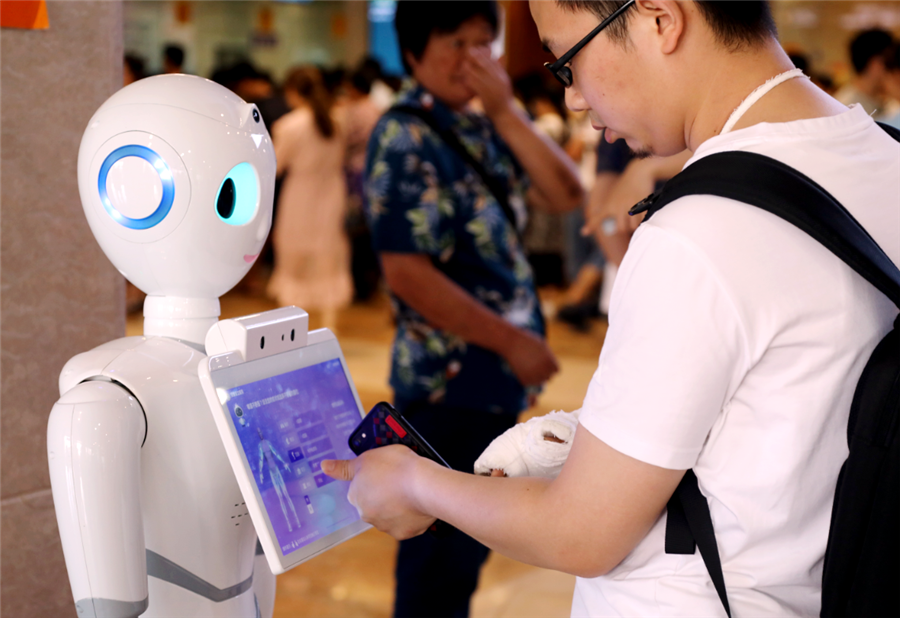AI gives doctors a hand


Special dictionary
To open the app, Qi can log in with either a fingerprint or a combination of face and voice recognition. He then just speaks into his smartphone and the app types up the information precisely.
Because doctors use many professional medical terms, iFlytek engineers said they built a special dictionary to make speech recognition more precise.
"The system also features deep learning technology, which means the more doctors use the system, the more precise the results will be," said Lu Xiaoliang, deputy general manager of iFlytek's intelligent healthcare business.
Some senior medical specialists found typing up records on a computer tedious, so the hospital previously had to arrange an assistant for each of them.
"With AI technology, the senior experts can now also work alone well, saving a lot of human resources for the hospital," Yan said.
Qi said the speech-recognition technology could help dentists even more, as they were not able to spare a hand to write up records when working on patients' teeth.
"They just need to keep the speech-recognition function working," Qi said.
The function also works on a computer with a microphone, but it keeps typing as Qi keeps speaking, even though some of the things he says have nothing to do with his diagnosis, and he needs to delete them when he ends the recording.
That could prevent a dentist from chatting with a patient to relieve their anxiety, because there would be too much information to delete afterward.
The results of certain examinations of patients are automatically entered into the app, allowing Qi to check them anytime, anywhere.
"In the past, before making ward rounds to the patients' rooms, we were first offered many print records and then asked the patients about their health conditions and took notes before returning to the office to type on computer-based systems", Qi said.
But part of the preparatory work can now be done ahead of time, even when a doctor is on a bus or subway train.
Yan said a more important feature of the system is that it can help doctors read medical images to speed up diagnosis and prevent misdiagnosis.
Take CT scans for example. A doctor could spend minutes reading a CT case, which usually consists of many - sometimes hundreds - of images, before making an initial diagnosis, but Lu said it takes less than a second for the AI system to do the same thing.
"Best of all, the system won't get tired," he said.
The AI-enabled system has helped interpret thousands of CT images, Lu said, and the accuracy for detection of lung nodules, one of the indicators of potential lung cancer, has reached 99.4 percent.
To build the intelligent hospital, Yan said several AI-enabled systems have been launched since 2016 in cooperation with iFlytek and other firms, including internet giants Alibaba and Tencent.
"None of the systems can work perfectly, but in the long run they will improve over time," he said. "The medical sector will inevitably become more intelligent, and we cannot miss the chance to lead the trend."
The hospital has not paid iFlytek a penny since they began cooperating in 2016.
"They don't need to," said Chen Liang, an iFlytek employee who leads a team of more than 10 engineers working in the hospital. "It will be by learning from the hospital what they really need that we can develop better systems."
Yan is prudent when discussing the potential of AI-enabled systems, but they are already helping to guide patients around the hospital and allowing it to link up with hospitals around the province.
Another example is work on an intelligent emergency medical system.
"Once you call the emergency center for first aid, your health information, based on all of your hospital records, will be provided to the first-aid personnel in the ambulance and doctors at the hospital," said Yan, who was in charge of the hospital's emergency medical center from 2004 to 2007.
All the necessary advice on tailored first-aid solutions will be given to the medical personnel through the AI technology and they will see the advice via a smartphone app, he said.
The hospital has invested millions of yuan in the project, just dealing with its own medical records, and Yan said expanding the practice will require more effort.
The provincial authorities have launched a plan to build personal healthcare profiles, which can be shared between hospitals, for every citizen, and the project is progressing well, he said.
Intelligent healthcare is becoming a trend in hospitals. Hefei has also established a municipal-level intelligent hospital and the provincial authorities plan to set up six more at the provincial level and at least 15 at the municipal level this year.





































